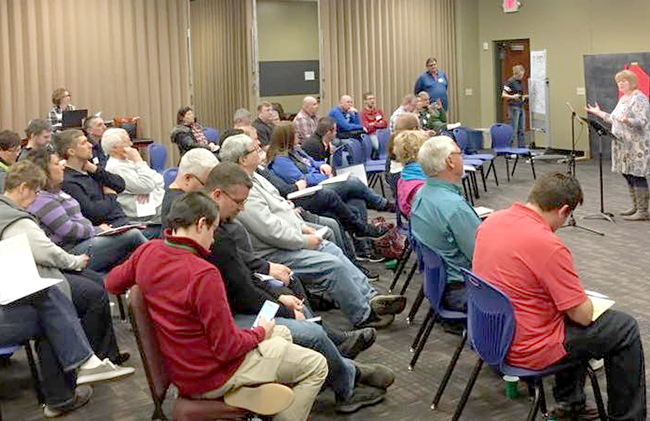In Northwest Iowa, churches are spurring each other on to better discipleship.
By Chris Godfredsen
Many churches in the Synod of the Heartland are engaging in Transformed & Transforming initiatives: devoting attention to cultivating transformation in Christ, to equipping emerging leaders of today and tomorrow, and to engaging in Christ’s kingdom mission. One way that nine Iowa churches are engaging is in a two-year process known as the East and West Sioux Discipleship Learning Community. The churches are eight months into the process.
In this learning community, teams from these churches are developing a “discipleship pathway” for their congregations, or a structure in place to help people grow deeper in their faith and become more faithful followers of Jesus. The learning community allows churches to work out their ideas in a group and to be held accountable.
The model is as old as the book of Hebrews: “And let us consider how to stir up one another to love and good works, not neglecting to meet together, as is the habit of some, but encouraging one another, and all the more as you see the Day drawing near” (Hebrews 10:24-25, ESV).
Local leaders have been working with Jill Ver Steeg, director of transformational engagement for the RCA. Ver Steeg says she loves the way she sees these churches living into, and out of, this passage.
“What is happening in northwest Iowa is that these churches are stirring each other up and spurring one another on,” she says. “They have committed to spurring one another to strengthen and reimagine discipleship. This group is managing the tension of moving away from old or no-longer-useful mental models of discipleship in order to ask the right questions and engage one another around what it means to actually love your neighbor and walk alongside them as they encounter Jesus.”
The learning community process looks something like this: Pastors and their teams gather regularly over two years to learn together, to take stock of their congregations, to set goals, and to make progress toward those goals. Along the way, they reflect on their congregations by asking, What is? What could be? What should be? And what will be? The teams set goals to work toward between meetings, reporting to the rest of the learning community on what they intend to do to create their own discipleship pathway.
Through coaching and peer learning, each church is held accountable for its strategic goals and for creating a community of practice in the process.
“Beyond the transformation that happens within the church, what God is doing in northwest Iowa is breaking down walls in order that a greater unity is not only attainable, but possible,” says Ver Steeg, who believes that the participating churches will have an impact beyond their individual congregations.
“Out of discipleship flows leadership and mission,” she says. “Most leadership problems in the church are actually rooted in discipleship. In this process, we are seeing pastors grow in their character and in their own personal transformation so that they can facilitate movement within their church and beyond.”
The participating churches include First Reformed Church in Hospers, First Reformed Church in Hull, Rejoice! Community Church (RCA) in Le Mars, First Reformed Church in Maurice, Good News Community Church (RCA) in Okoboji, First Reformed Church in Sibley, First Reformed Church in Sioux Center, New Life Reformed Church in Sioux Center, and Hope Reformed Church in Spencer.
The East and West Sioux Discipleship Learning Community is an adaptation of a process that a number of churches have engaged in through the RCA and Leadership Network, an organization that helps churches make a greater impact for God’s kingdom. Two Synod of the Heartland congregations, Good News Community Church in Okoboji, Iowa, and Trinity Reformed Church in Orange City, Iowa, have been integral in helping to shape and facilitate this process in East and West Sioux Classis.
Chris Godfredsen is East and West Sioux Classis leader.





